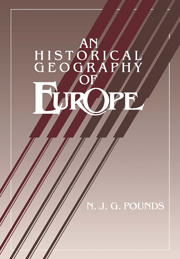Part II - The Middle Ages
Published online by Cambridge University Press: 14 January 2010
Summary
It has rarely happened in the course of human history that a material culture has sunk to the point at which skills have been lost, technologies forgotten, and a whole way of life lowered. Of course there have been recessions when the level of prosperity declined, but on such occasions nothing was irretrievably lost. The decline which ended the Roman empire in the West was of the former kind. Life was reduced to a lower plane, from which mankind had again to struggle upward. The Middle Ages, taken as a whole, was such a period of regrowth, though the pattern which emerged at the end was a very different one from that which had been eclipsed with the decline of the Roman empire.
Any discussion of the end of the empire and the beginning of the Middle Ages must take into consideration that it was only the western empire which “fell.” The eastern empire, with its focus in Constantinople, continued its sometimes precarious existence for another thousand years before it succumbed to the Turks. The western empire ended in a formal sense in 476, but economic and social decline had been apparent long before this in the dwindling size of cities, the drying up of trade, and the diversion of the empire's energies and resources to protecting its frontiers in north and east.
- Type
- Chapter
- Information
- An Historical Geography of Europe , pp. 69 - 73Publisher: Cambridge University PressPrint publication year: 1990



